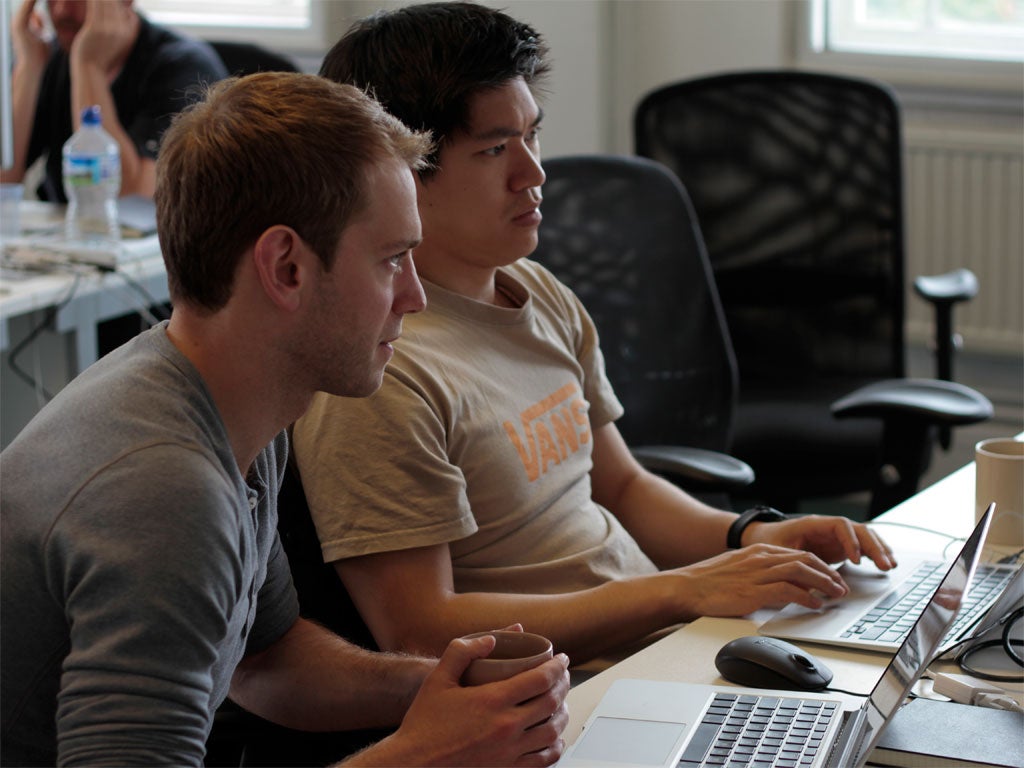Cracking the code: What is Makers Academy?
Advertorial feature

If someone had told me that a week and a half into my intensive web development course I would find myself coding a ‘Fizz buzz’ programme at great speed in front of a room of people, whilst singing along to Haim to earn ‘entertainment points’, I would have thought them confused - not only about what Makers Academy would be like, but also how quickly I would learn whilst there. Turns out they would have been very accurate.
I have accidentally ended up in the coding world. The plan was to become an entrepreneur, not a programmer. I did not want to be the person that stayed in, behind the computer all day. I wanted to be the one coming up with the ideas, speaking to people, giving pitches to investors. However, after beginning to explore the dynamic world of tech startups, I came to realise that the image in my head of what it means to be ‘the tech person’ was terribly out of date.
Coding is the new, cool thing to do. It is the currency to have in the entrepreneurial world. Companies such as Makers Academy and Codecademy, startups themselves, are doing an excellent job of creating strong brands in the coding field and making tech fashionable. With reports claiming that there are in the region of 700,000 unfilled jobs in the tech sector, this is the field where opportunities are rife.
The work for Makers Academy started before we even entered the building. Every Maker is sent some preparatory material to work through. Luckily for me, I was not approaching it from the position of a complete novice, being that I have just taken part in the Code First: Girls coding programme, run by Entrepreneur First. Still, I knew that this did not mean that Makers Academy would be easy. From reading other blogs by current cohort members, I was fully aware that coding full-time, five days a week, was in a completely different league to turning up to a short evening class twice a week.
Over the first two weeks, we have already covered a wealth of material. We were first introduced to the Command Line, a means of interacting with your computer and its programs, before looking at ‘git’, a method of storing different versions of your code and being able to jump to different ones depending on your needs. The main language we are learning is called Ruby, where emphasis has been placed on code that is natural to read and easy to write.
Friday is test day. They start as one hour in length, as did last week’s, but we’re told to expect weekend long tests by weeks three or four. You have the chance of earning a unique colourful sticker if you complete it correctly, the point of the test is not for you to compete against each other of for the teachers to have a more formal measure of how you’re progressing. There are no marks. Nothing is noted down.
Rather they are there purely for your benefit. I forgot that momentarily after the first test. I was disappointed in myself that I couldn’t complete it at that others had gotten far further. Then I realised that I was going down exactly the path that the team at Makers had told us not to, and a path which many of us wrongly take in our day-to-day lives. Instead of moping about, I proceeded to work through the test again, proving to myself that I did have the capability of doing it, but that the environment of the test had gotten the better of me. Doing this exercise meant that when our tutor gave us another chance to earn the badge, I was able to take advantage of the opportunity.
Steadily working through the preparatory material before coming here gave me a little flavour of what it would be like spending my days coding. I was struck by the sheer amount of patience that is required if you want to excel in this field. It became important to not only prepare myself technically for the beginning of the course, but mentally as well. In fact, from day one, there has been a push by the Makers Academy team that we focus on the mental and the emotional, as how we feel inside and react to that is a big factor in how successful we will be over the duration of the course. An example of this is the way we deal with failure. You must never ever personalize failure. You are never ever a failure. If you fail at something, it wasn’t you, but rather your approach, and so next time you attempt your task, focus on changing your approach and you’ll get there eventually. We’re given advice such as this multiple times a day, and I’m steadily building up a bank of guidance that’ll be immensely valuable not only for getting through this course, but for the rest of my life.
I don’t know what state I’ll be in in a week from now, six weeks from now, or when I’m facing the final hurdle, but I like to think I’m going to have fun the whole way. This blog will chart my journey to becoming a Maker – the technical, the practical, the emotional, and the social. In the process, I hope to get across why anyone trying to develop technical skills for themselves at whichever stage in life is making a very smart move.
Right, must go now - it’s time for my second test!
Join our commenting forum
Join thought-provoking conversations, follow other Independent readers and see their replies
0Comments